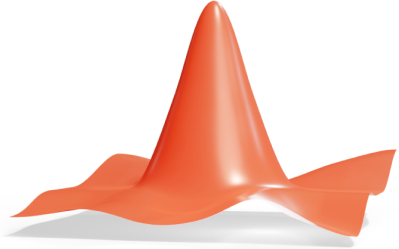What Are Linear Functions?
Video Crash Courses
Want to watch animated videos and solve interactive exercises about linear functions?
Click here to try Video Crash Courses called “Linear Functions”!
Linear functions express straight lines. The straight lines can be gradual or steep, and they may go up (positive), go down (negative), or be horizontal. They are horizontal when the slope .
Formula
The Formula for Linear Functions
where is the slope of the line and is called the constant term, and is the -coordinate where the graph intersects the -axis. The slope tells you how much the graph increases or decreases when the -value increases by 1.
Example 1
The function
tells you that the graph intersects the -axis in the point and that the slope . That means that when increases by 1, decreases by . The graph is therefore sloping downwards from left to right. It looks like this:
Rule
Important Properties of the Linear Function
-
The slope tells you how much the graph increases/decreases when increases by 1.
-
If , then the graph slopes upwards from left to right, and if , it slopes downwards.
-
The graph intersects the -axis at the point .
-
The graph is a straight line with coordinates .
Example 2
Chelsea Clinton had a babysitter when she was a kid. Her father, Bill, was a bit stingy and decided to pay the babysitter per hour plus for travel to their home. Find a function that shows how much Bill had to pay the babysitter for hours.
You know that Bill has to pay $ every time the babysitter comes to take care of Chelsea. You also know that he pays $ per worked hour. The babysitter thus gets $ for one hour, for two hours, and so on. Bill pays thus dollars when the babysitter works hours. The expression for how much Bill pays the babysitter looks like this:
How much does Bill have to pay for the afternoon when he and Hillary have to go to a meeting at the White House and need a babysitter for 3 hours?
Here , so you get the following calculation:
The babysitter gets $ for 3 hours of work.
The babysitter planned to go to a U2 concert a few hours after she had to babysit. Tickets for the concert cost . She forgot her wallet at home, and hoped that she would earn enough money during the afternoon to cover the ticket. How late do Bill and Hillary have to be in order for the babysitter to have enough money for the concert?
Here you know that the babysitter must earn at least $ to be able to afford the ticket, meaning . What you need to find is how long she must babysit— that is, a value for . You put in the value for and solve the equation for :
To be able to afford the concert, she had to babysit for four hours. So she hoped that Bill and Hillary were hour late. If they were not, she would have to borrow money from a friend, or ask Bill for a pay rise.
You need two points to find the function of a line. If you know two points that are on the graph, you can use the two formulas below to find the slope and the constant term . The symbol (delta) is a Greek letter. In mathematics you use it to describe change or difference. This means that you read the formula below as “ is equal to the change in divided by the change in ”.
Formula
How to Find a Function From Two Points
The line through the points and has the slope
where and .
Note! Study the figure closely!
Example 3
Find the slope of the line that goes through the points and , and its intersection with the -axis
You let and . You would get the same result if you swap and . By inserting those values into the formula, you get
You now know that your line decreases by 2 when you move one place to the right. Let’s see what the intersection with the -axis is:























